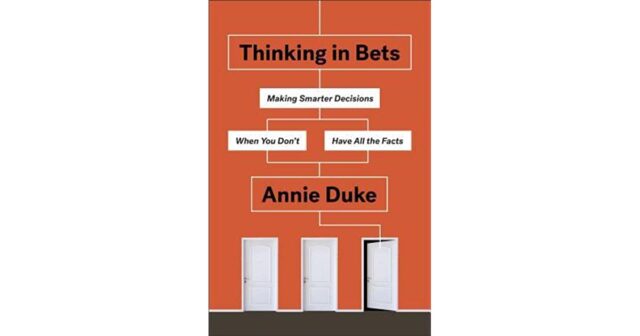
Quick, think about the best decision you made this year. Got it? Ok. How did that decision turn out? If you’re like most people, you picked a decision that ended well. Why? Because we tend to judge choices based on outcomes. But this is a problem, and doesn’t lead to better decisions in the long run.
We shouldn’t use results to judge our decisions. Luck plays too big of a role. Instead, we should focus on what we can control. We should focus on our decision-making process.
To tell you why, I’m going to tell you about a book I read about decision making: Thinking in Bets by Annie Duke. Her premise is that great thinkers are gamblers. How did she come to this conclusion? She is a former poker player, so she has some perspective on this topic!
Ok, back to great thinkers being gamblers. What makes them good decision makers? They constantly make bets and use probabilities. Tough choices require prospective thinking, because it makes us consider the future. Marriage, voting, investing, parenting, jobs—all the important decisions in life force us to think about how things will unfold.
The problem? The future isn’t certain. In ten years, the world will look much different than any of us can imagine. So, how do we make good choices when we’re not sure how things will play out?
How To Make Good Decisions
Good decisions are the result of a good decision making process. Let’s discuss 4 lessons Duke lays out in the book about what makes a good decision process:
Think in probabilities, not absolutes
We naturally think in black and white, but life is much more complicated. Resist saying “that’s guaranteed,” and use percentages instead. The faster we learn that the future may go many different directions, the better!
Keep your mind open
Great decision makers are like foxes —they’re nimble, flexible & adaptable. It’s easy to always use one big idea to interpret the world, but practice the opposite. Try using many different perspectives before you settle on an answer.
Work in groups made up of diverse people
We all have biases we can’t escape on our own. The solution? Build a team of thinkers that value diversity of thought! Point out mistakes you see in each other. Ask hard questions, and hold each other accountable.
Update your beliefs
Treat each decision like a little test. Ask yourself, how did that go? What did I learn? How can I improve next time?Of course, some choices are too big to experiment with, but you can use most decisions as chances to learn and improve your thinking.
That’s it, that’s the process. Let’s summarize:
- Think in probabilities, not absolutes;
- Keep your mind open;
- Work in groups made up of diverse people;
- Update your beliefs.
Again, the book is called Thinking in Bets: Making Smarter Decisions When You Don’t Have All the Facts. I highly recommend it!